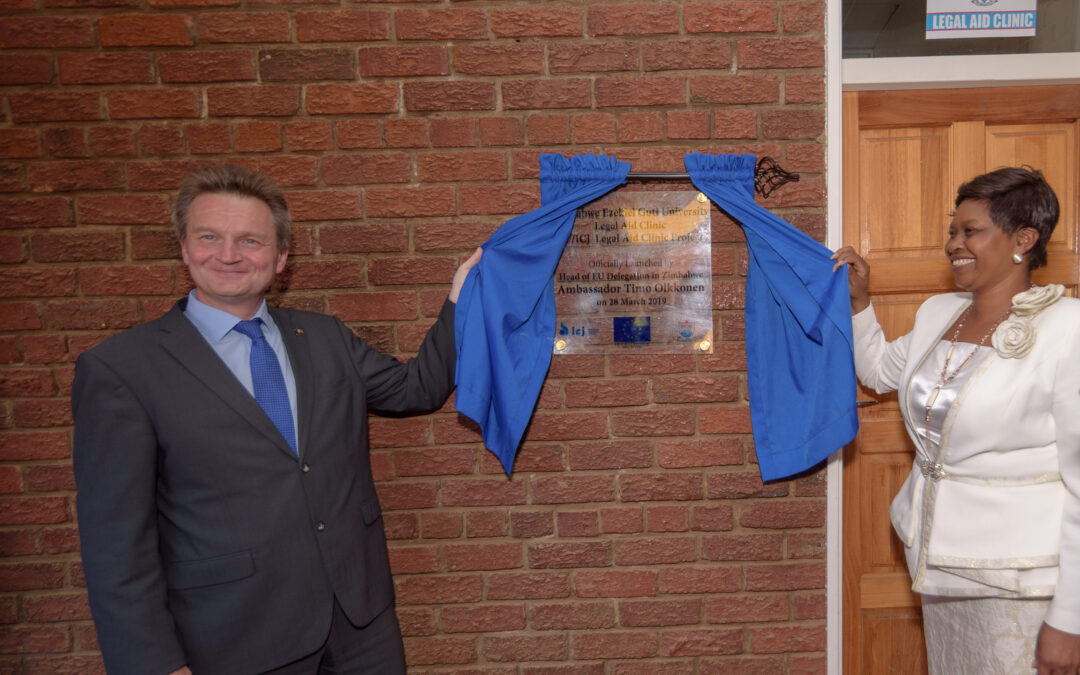
Mar 28, 2019 | News
Today, the ICJ launched a project at Zimbabwe Ezekiel Guti University intended to assist with legal services to those in need in Bindura.
The legal aid clinics project, which is supported by the European Union, is aimed at improving access to justice in Zimbabwe while also providing an opportunity for students to develop critical skills that will enhance their work as legal practitioners.
Speaking at the launch, the Ambassador of the European Union Delegation to the Republic of Zimbabwe, Timo Olkkonen commended the University for being socially responsive to the community surrounding it.
He remarked, “in these difficult economic conditions, more people than before are finding it difficult to afford legal representation. This in turn negatively impacts on the protection of their constitutional rights. The establishment of the legal aid clinic will address this.”
Professor Chingarande-Mutanga, the Vice Chancellor of Zimbabwe Ezekiel Guti stated that, “The establishment of the legal aid clinic is a special innovative hub with the idea to develop a practical and professional who is well rounded and able to provide solutions to the legal challenges faced by the community.”
Arnold Tsunga, ICJ’s Africa Regional Director, remarked that “this initiative supports the full implementation of the Constitution and promotes equal access to justice for all through addressing the needs of those in disadvantaged in their capacity to obtain needed legal services.”
The launch was attended by the Mayor for Bindura, Carlos Tokyo, the Executive Secretary of the Law of Society, Edward Mapara, representatives from the Judicial Service Commission, students, and other residents of Bindura.
Contact
Brian Penduka, t: +263772274307 ; e: brian.penduka(a)icj.org
Elizabeth Mangenje, t: +263774742420 ; elizabeth.mangenje(a)icj.org
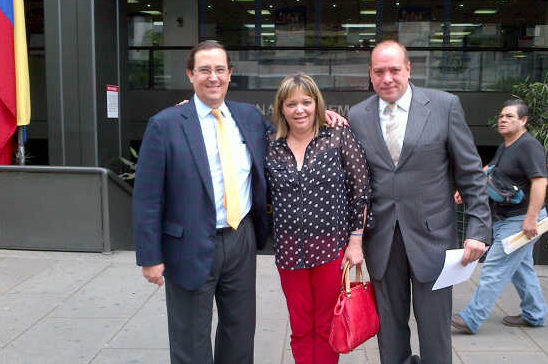
Mar 26, 2019 | News
The ICJ condemns the sentencing of Venezuelan Judge Maria Lourdes Afiuni to a further five years of imprisonment.
On 21 March, a court in Caracas sentenced Judge Afiuni on unfounded charges of “corruption”.
“This further five-year sentence against Judge Afiuni is both the latest in a long series of severe violations of her human rights, and also illustrates the grave extent to which independence of the judiciary in Venezuela has been more broadly undermined,” said Matt Pollard, ICJ Senior Legal Adviser and UN Representative.
Judge Afiuni was arbitrarily arrested and detained in 2009 after then-President Hugo Chavez publicly demanded she be imprisoned for 30 years, as she had released an accused person citing a decision by the UN Working Group on Arbitrary Detention that his detention was unlawful.
While in detention, she was subjected to torture and other ill-treatment.
In 2010, the UN Working Group on Arbitrary Detention issued an opinion declaring Judge Afiuni Mora’s detention arbitrary.
She was held in prison for 14 months before being transferred to house arrest for health reasons in 2011.
In 2013 she was granted parole but ordered not to leave the country or to use social media.
The UN Special Rapporteur on the Independence of Judges and Lawyers reacted earlier today to the latest sentencing by reaffirming the arbitrariness of her deprivation of liberty and the fact that her treatment amounts to reprisals for having implemented the UN Working Group’s decision.
The Rapporteur also said that the ruling “underscored his serious concerns about the independence of the judiciary in Venezuela, the impartiality of judges and prosecutors and the pressures they faced in handling politically sensitive cases.”
Further background on the situation for the judiciary in Venezuela, and Judge Afiuni’s case, is available here.
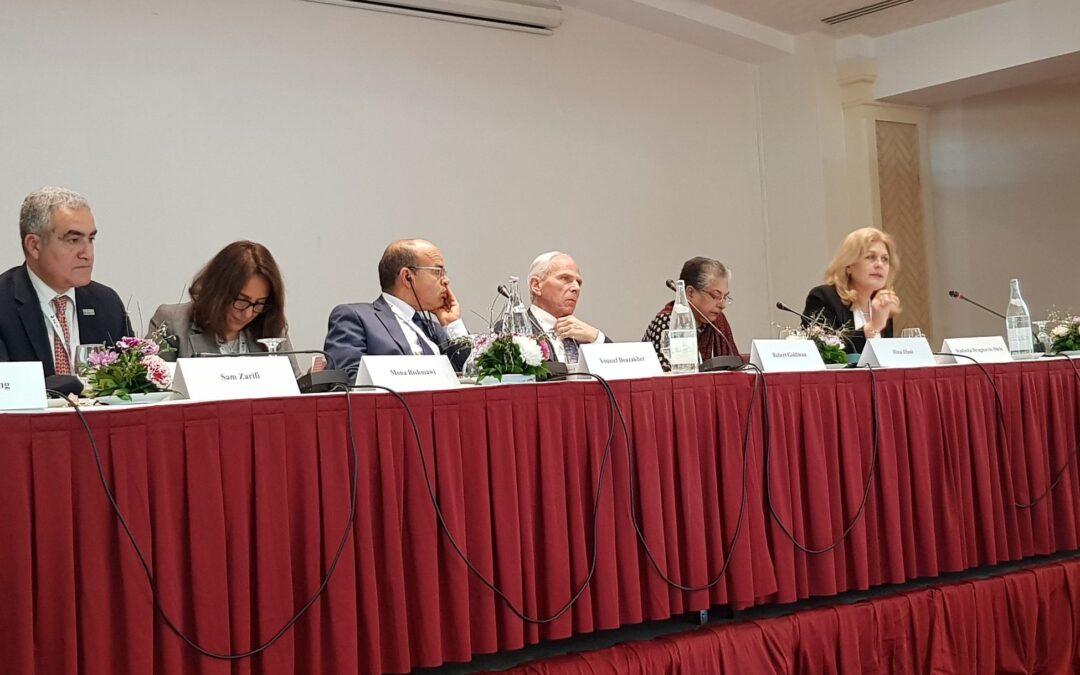
Mar 23, 2019 | News
Some 100 distinguished judges and lawyers from around the world commit to expanding the reach of human rights and rule of law principles, in the face of a global backlash against human rights values. The Tunis Congress is the ICJ’s 18th Global Congress since 1952.
The ICJ World Congress, consisting primarily of jurists serving as Commissioners, ICJ National Section and affiliates, and the ICJ Secretariat, is discussing strategy for concerted action and issue a final Declaration reflecting the outcome.
“Since its founding 1952 the ICJ has been steadfast in its belief in the primacy of human rights grounded in rule of law principles as indispensable for well being of all people, as well as for peaceful and just international order,” said Sam Zarifi, ICJ Secretary General.
“Cynical manipulation by authoritarian populists positions the rule of law and human rights as obstacles to the popular will. But as the ICJ’s experience over the past six decades has shown, the rule of law is inextricably bound with the proper functioning of democracy and to the protection and promotion of human rights,” he added.
The ICJ Congress will focus on five key areas of concern: the independence of judges and lawyers and administration of justice; access to justice and accountability for human rights violations; global security and counter-terrorism; equality and non-discrimination; and fundamental freedoms and civil society space.
“The international human rights legal framework has allowed for huge improvements in the lives of people around the world since the Universal Declaration of Human Rights 70 years ago, and the ICJ has played an important role in the development of this legal framework,” Zarifi said.
“But we are now witnessing a resurgence of some of the dangerous, insidious ideas and practices that have led the world to carnage and chaos in the past: the scapegoating of groups such minorities, refugees and migrants; the undermining of multilateral institutions; and the silencing of civil society and those who are giving voice to those who are marginalized on the basis of their gender, religion, ethnicity, physical capacity or sexual orientation,” he added.
“Global powers such as the United States, Russia, and China are actively attacking the rule of law and respect for human rights around the world, while the European Union is distracted by the politics of xenophobia and fearmongering,” he further said.
“It is now crucial for other States, and for people around the world, to show that respect for the rule of law and human rights are universal values and global demands, and the ICJ is proud to pull together the community of jurists from all regions of the world to support these values and demands,” he added.
In the face of these threats and challenges, the Congress will consider means to defend and strengthen the rule of law and legal protection of human rights globally, regionally and in individual countries.
The ICJ is made up of around 60 distinguished judges and legal practitioners from all parts of the world and diverse, works on all five continents and addresses human rights protection in dozens of countries.
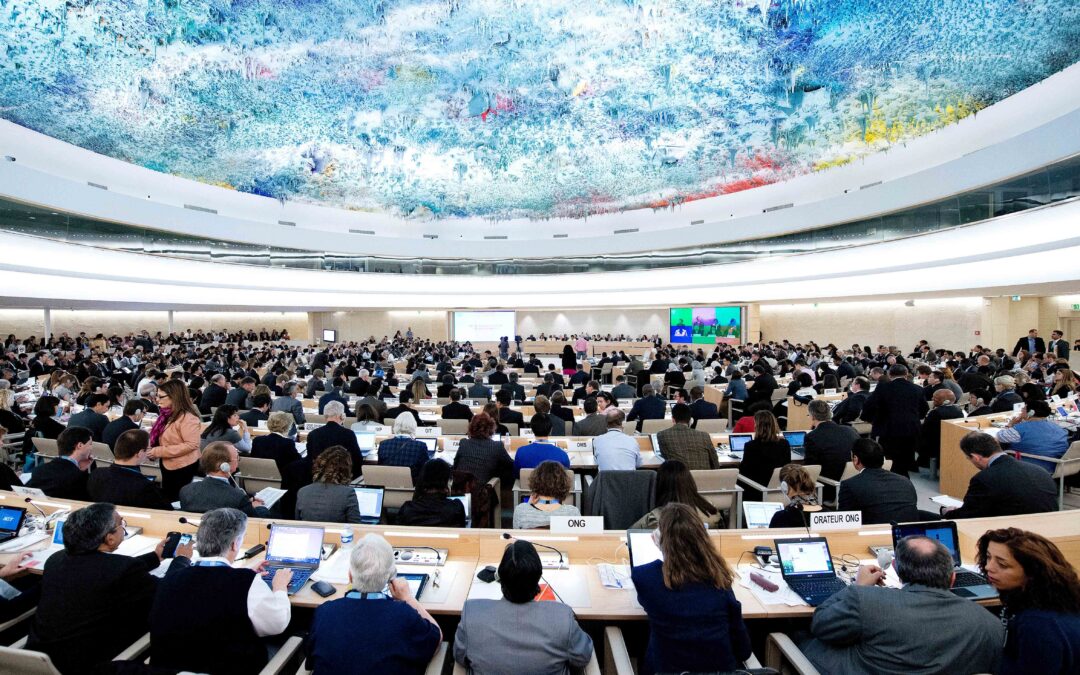
Mar 22, 2019 | News
The ICJ today strongly welcomed the renewal of the key UN expert on counter-terrorism and human rights, on terms that maintain the mandate’s independence, integrity and its essential focus on human rights.
The renewal of the mandate of the Special Rapporteur on the promotion and protection of human rights and fundamental freedoms while countering terrorism, was enacted by a resolution adopted by consensus at the UN Human Rights Council in Geneva.
To acheive this successful outcome, Mexico (which leads the resolution) and other States had to defend the text of the resolution against attempts by Egypt and other States to insert language aimed at diluting, distorting or distracting the mandate from its current focus on preventing and responding to violations of human rights and on securing respect, protection and fulfilment of the human rights of victims of terrorism.
The Special Rapporteur delivers thematic reports to the Human Rights Council, carries out visits to countries, and acts on individual complaints. In the overall counter-terrorism architecture of the UN, the Special Rapporteur is also the only person with an exclusive independent mandate to remind States of their human rights obligations while countering terrorism, to advise them how to do so, and to draw public attention when they do not. So any dilution of the mandate would have also put the integrity and efficacy of the overall UN counter-terrorism strategy and architecture at risk.
Following the adoption of the mandate renewal resolution by the Council, the ICJ and other organisations expressed its deep appreciation for Mexico’s efforts, together with the strong support of numerous other States, to secure the future of the mandate.
The resolution text is available here: https://undocs.org/A/HRC/RES/40/16
Additional background is here.
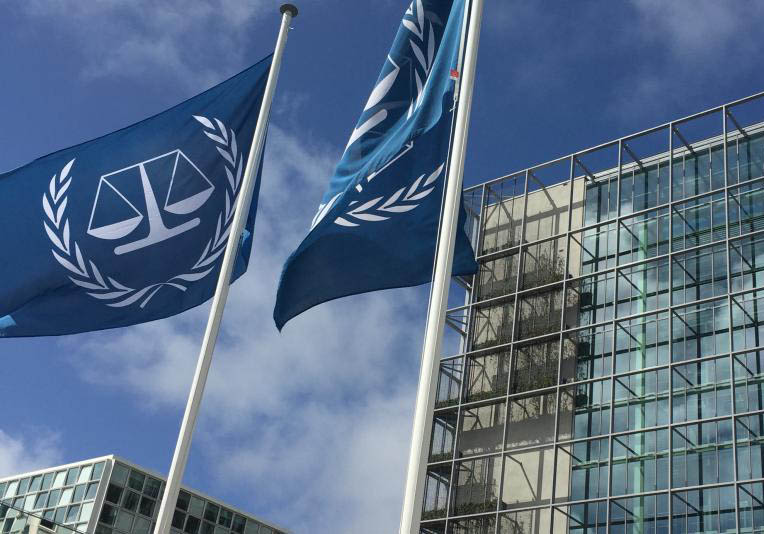
Mar 21, 2019 | News
In a letter to Assistant Secretary-General for Human Rights, Andrew Gilmour, the ICJ, the American Civil Liberties Union (ACLU) and the International Service for Human Rights (ISHR) call on the UN to address a clear case of intimidation and threat of reprisal by U.S. Secretary of State Michael Pompeo.
In remarks to the press on 15 March 2019, Pompeo explicitly threatened to revoke or deny visas to International Criminal Court (ICC) personnel who attempt to investigate or prosecute alleged violations committed by American nationals or against citizens of U.S. allies.
The ASG is mandated to lead efforts within the UN system to end all intimidation and reprisals against those cooperating with the UN on human rights. In keeping with this mandate, the ACLU, ICJ and ISHR call on the ASG to take urgent action, including by publicly denouncing the comments, and urging U.S. representatives to refrain from adopting any legislation, policy or practice that has the effect of undermining unhindered access to and communication with the ICC and other international bodies.
The letter states that ‘The purpose of the visa restrictions is to block and deter legitimate criminal investigation into serious crimes under international law. Not only might they have a chilling effect on ICC personnel and others advocating for accountability, but they will set a dangerous precedent with serious implications on the overall fight for impunity, especially the right of victims and their legal representatives to seek justice and reparations without fear of retaliation.’
A similar communication has also been sent to three UN experts – the Special Rapporteurs on the situation of human rights defenders, on the independence of judges and lawyers, and on the promotion of truth, justice, reparation and guarantees of non-recurrence. The experts are similarly called on to publicly denounce the comments and send a formal communication to the U.S.
“The policy announced by Pompeo is part and parcel of a concerning attack by the current U.S. administration on multilateralism, international rule of law, and global and regional bodies mandated to monitor and investigate human rights violations and fight impunity,” said Sam Zarifi, Secretary General of the ICJ.
Pompeo’s announcement comes on the heels of threats made by U.S. National Security Advisor John Bolton in a 10 September 2018 speech to the Federalist Society.
In that instance, Bolton explicitly threatened ICC judges, prosecutors, and personnel if they proceed with an investigation into alleged war crimes committed by U.S. military and intelligence forces in Afghanistan, as well as any company or state that assists the ICC.
“This is an unprecedented attempt to skirt international accountability for well-documented war crimes. It reeks of the very totalitarian practices that are characteristic of the worst human rights abusers, and is a blatant effort to intimidate and retaliate against judges, prosecutors, and advocates seeking justice for victims of serious human rights abuses,” said Jamil Dakwar, Director of the ACLU’s Human Rights Program.
The letter cites Human Rights Council Resolution 36/21 and the UN Declaration on Human Rights Defenders, which reaffirm the right of everyone, individually and in association with others, to unhindered access to and communication with international bodies.
“This latest attack by the US demands the strongest response from the UN, which until now has remained silent on the US’ bullying of the ICC,” said Madeleine Sinclair, Legal Counsel and New York Director of ISHR.
“Pompeo’s threats are a blatant violation of the right to cooperate with the ICC, undermine the ICC’s effectiveness and credibility, and amount to an attack on the international system itself,” she added.
Contact:
Sam Zarifi, International Commission of Jurists, e: sam.zarifi@icj.org ; t: +41 22 979 38 00
Abdullah Hasan, American Civil Liberties Union, e: ahasan@aclu.org, t: +1-646-905-8879
Madeleine Sinclair, International Service for Human Rights, e: m.sinclair@ishr.ch, t: +1-917-544-6148

Mar 20, 2019 | News
Today, the ICJ launched a legal aid clinic project in collaboration with Great Zimbabwe University, Herbert Chitepo Law School to help facilitate the establishment of a legal aid clinic at the University’s Mucheke campus.
The clinic is located at the Mucheke Campus of University in a high-density suburb in Masvingo, thereby making the services offered by the legal aid clinic more accessible for persons from disadvantaged or marginalized groups in the community.
The project, supported by the European Union, aims to improve access to justice for communities by offering free legal assistance at the University legal aid clinic, while also providing an opportunity for students to develop critical skills that will enhance their work as legal practitioners. The activity is part of a wider initiative to develop and improve University legal aid clinics in Zimbabwe.
Arnold Tsunga, the ICJ Africa Regional Director, remarked that the launch of the legal aid clinics is a building block towards greater access to justice for the people of Zimbabwe and a positive step towards attainment of SDG 16 which speaks to the importance of peace, justice and strong institutions.
Francisca Midzi, a representative of the European Union delegation to Zimbabwe, stated in her remarks that “as the law students encounter real legal problems faced by the people, [the initiative] will teach them to have a social and professional responsibility to pursue justice in society. Herbert Chitepo Law School is injecting and inculcating a spirit of service in their students and they will carry it wherever they go to practice law and gradually this will transform Zimbabwe’s legal system to be more concerned about a court user who has limited knowledge and means to fully access justice.”
Professor R.J. Zvobgo, the Vice Chancellor of Great Zimbabwe University, commended this milestone achievement and stated that it provides an opportunity for the students to give back to the community by improving the ability of persons from affected groups to access justice.
“The free legal aid assists in eradicating the notion that a university is an ivory tower, divorced from the realities of the community in which it is located,” he said.
Contact:
Brian Penduka, e: brian.penduka(a)icj.org, t: +263772274307
Elizabeth Mangenje, e: elizabeth.mangenje(a)icj.org, t: +263774742420










